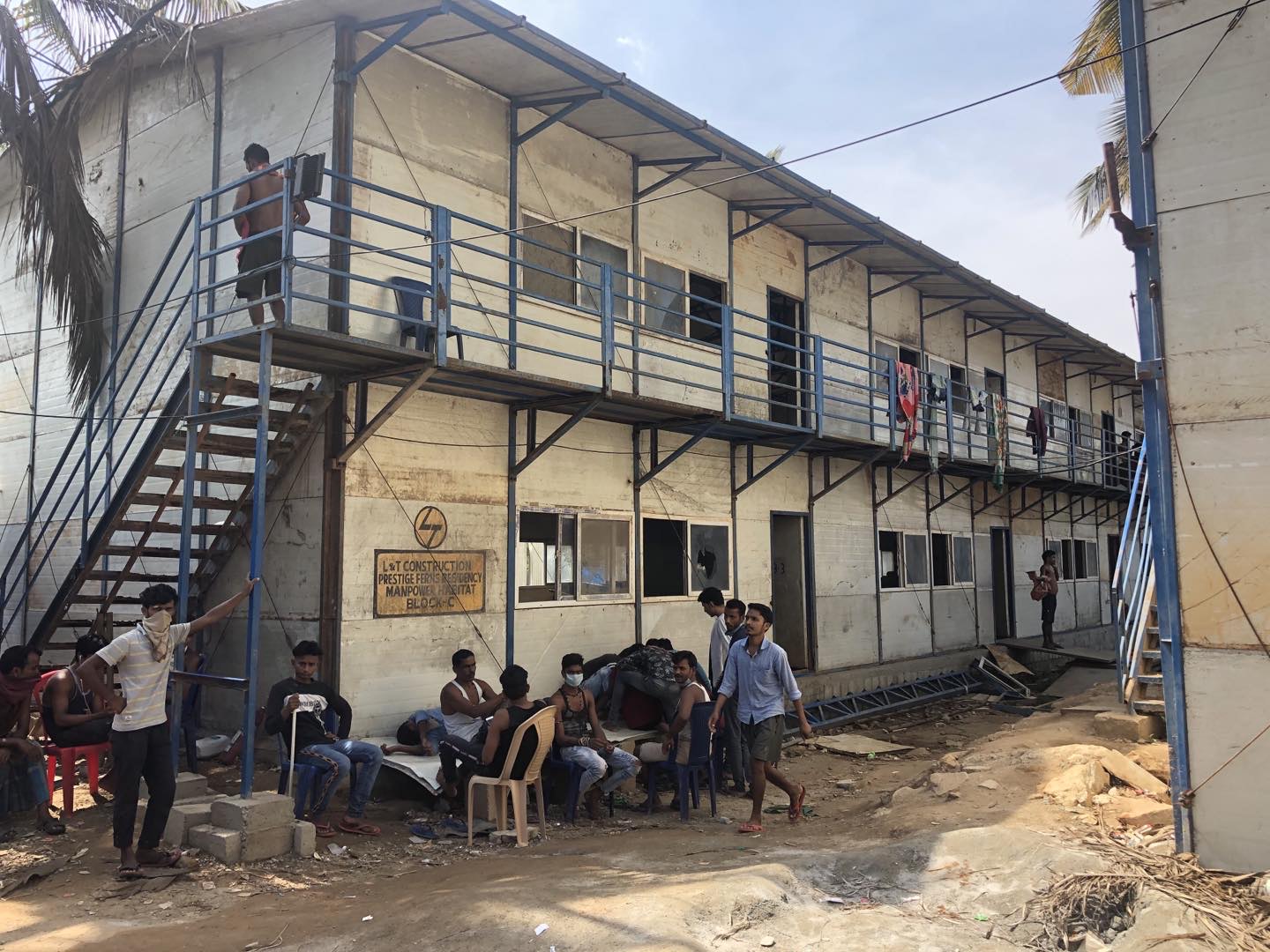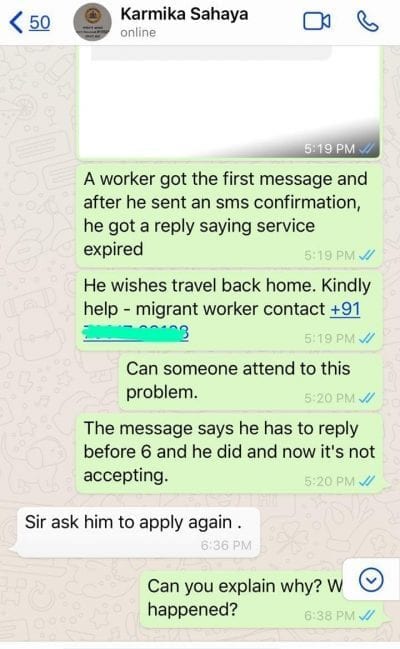
Do we go home? ask migrants as Karnataka messes up crisis scene

It’s been nearly a month since the Ministry of Home Affairs started running Shramik Special trains to ferry stranded migrants to their home states, but confusion, the inefficiency of departments concerned and lack of transparency in the running of trains, has made it difficult for migrant labourers in Karnataka to board trains home.
From the point of registration (to get a seat in Shramik Special trains) to information on available trains and protocols on reaching home states, there is no clarity from the government on the entire process.
For a migrant worker, getting a ticket for a Shramik Special trains is akin to winning a lucky draw. There is also no clarity, either from the government or the babus, on the criterion that is applied to select workers to board the special trains, from a list of applicants.
In short, the state led by Chief Minister BS Yediyurappa, has systematically failed in assisting migrant workers and instead introduced hurdles at every stage of the travel process. From cancelling trains at the behest of builders and construction companies to charging exorbitant prices and then reversing these decisions, the government has faltered at every step.
Various government agencies and RSS leaders claimed that train travel for migrants was “free”, while others said that the government was subsidising it. In reality, it was far from free. Many workers who were hit by job loss, delay in payments and left with no savings, took loans to pay the travel fare.
Transfer the messenger, spread chaos
In a sudden move, the government shunted out labour secretary P Manivannan, who was trying to help migrant workers. The decision was reportedly taken at the request of builders and construction companies.
After Manivannan’s transfer, the new secretary failed to fill the vacuum left by him. Besides, he wasn’t easily approachable and Manivannan’s army of nearly 27,000 volunteers, entrusted with busting fake news and disseminating COVID-19-related information were left in the lurch.
Related news: Migrants throng Palace grounds for special trains due to fake news
Many migrants fell for fake news and gathered at Bengaluru’s Palace Grounds last week hoping to get train tickets. There was chaos all around and it exposed the state government’s failure to act in time.
No SOP, confusion galore
The sheer lack of communication between concerned departments was palpable.
The Railways, labour department, police and helpline (on Twitter, WhatsApp and phone-in call centres) volunteers worked in silos, insulated from one another.
As per protocol, the Railways after getting a request for trains, relays the message to the divisional police, who in turn inform labour officers and concerned police stations under whose jurisdictions migrants reside. Despite this, it is still a mystery how one gets chosen to travel.
There is no standard operating procedure (SOPs) in place to decide who would travel, how they would get to the bus station amid lack of public transport and how will they get food, water or basic facilities on trains.
Sometimes the call is taken by the local police station, at times it is under media pressure and occasionally decisions are taken by the labour inspectors, who, from time to time conduct inspections.
In all this, one gets prioritised and another is left out. When the left out go to the police stations to ask when is their turn coming, they are beaten up and sent back to their shelters. In the process, many have lost hope and faith in the system.
A migrant’s struggle with language, tech-based help
Due to this many have given up on the government and started walking home, some as far as 2,000 km away.
Sample this: On May 26, Paresh Mondal, a migrant worker from West Bengal got an SMS from the labour department at 3.08 pm. It read: “If you want to travel by Shramik trains, SMS YES followed by las six digit of Sevan Sindhu application no to 161 from registered mobile number before 6pm.”
The sender of the message assumed that all migrant workers have a phone, they can read English/Hindi; and that they would be free to check messages and respond within three hours.
Now, the message Mondal got after a wait of 23 days had to be replied in three hours. He duly followed the process and sent the reply. At 3.14 pm he got a reply saying “service is expired.” If he didn’t complete the process by 6 pm, he would lose the chance to travel.
Mondal then approached The Federal reporter and a complaint was registered with the labour department helpline numbers – one at 4.05 pm and another at 5.19 pm. Both “helped” by asking the worker to register again on the Seva Sindu portal. On being asked a reason for this, one helpline asked us to contact 080 22636800, a Seva Sindhu helpline which did not connect for nearly 45 mins.
 Another messaged saying Mondal was not clear whether he had chosen “own vehicle” or other transport and hence they asked him to re-register. Here again the government presumes the workers will have access to the internet. In fact, many had paid ₹70-200 at cyber centres to get their registrations done.
Another messaged saying Mondal was not clear whether he had chosen “own vehicle” or other transport and hence they asked him to re-register. Here again the government presumes the workers will have access to the internet. In fact, many had paid ₹70-200 at cyber centres to get their registrations done.
The government helpline did not care to see that the applicant was a migrant worker looking for train-related travel (based on the application). The worker was back to square one again.
Now, imagine the frustration and plight of Mondal who had waited for 23 days and was asked to go through the same cumbersome process again.
Govt looks other way as city’s stepchildren suffer
Over the past few days, NGOs, volunteer groups, and reporters have offered to help migrants to get back home. Some have been lucky, while others haven’t been. This is because there was no set process in place.
Responding to reports that The Federal did on the plight of migrant workers, the labour department pitched in and helped, but after they were stripped of their dignity, made to beg and borrow and bear the brunt of police lathis.
Requests poured in for food and shelter, or to get them out of the clutches of subcontractors and for help with the Seva Sindhu registrations. Besides, there were also complaints of police brutality and delayed and non-payment of wage by subcontractors. Despite labour inspectors visiting the sites and acknowledging the problems, only warnings were issued. Requests were passed on to the employers to clear wages or let them go. But no one was prosecuted.
In Mangalore, a pregnant woman and her sister had to reportedly share space with 123 men in the same hall. No special treatment was provided for them.
Lekha Adavi, a Bengaluru based lawyer and activist, pointed how marriage halls and shelter centres designated by the government were shut all day, refusing to entertain migrant workers. The government looked the other way as people slept inside markets, on footpaths, bus stands and skywalks.
Every time civil society groups and labour unions took up the issue with the state and in the Karnataka High Court, incremental changes were effected.
Related news: Migrant workers made to stay back, work by government contractors
Despite court orders, the state has not furnished the numbers registered on the Seva Sindhu platform, how many have been provided with transport and food facilities and the numbers wishing to stay back.
The court has given time to the state government to respond by May 28. But the stranded workers have only one question — when will I get the chance to go home? To this, sadly, there seems to be no immediate answers.


